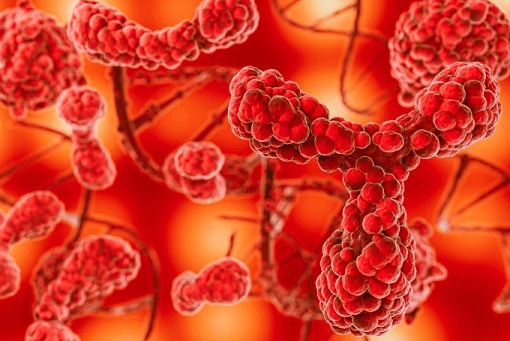Nikhil Prasad Fact checked by:Thailand Medical News Team Nov 26, 2024 1 year, 2 months, 4 days, 3 hours, 23 minutes ago
Medical News: COVID-19 has impacted healthcare systems worldwide, but its influence on cancer treatment and progression, especially in blood cancers, remains a subject of intense study. A new investigation by researchers from Dharamshila Narayana Superspeciality Hospital and Research Centre and Jamia Hamdard in New Delhi, India sheds light on the intricate relationship between COVID-19, immune exhaustion, and relapse of hematological malignancies. Surprisingly, this study found that hematopoietic cell transplantation (HCT) plays a protective role against relapse, even in COVID-19-positive patients.
 COVID-19 Linked to Relapse in Blood Cancers
Key Findings at a Glance
COVID-19 Linked to Relapse in Blood Cancers
Key Findings at a Glance
This
Medical News report explores the study that included 144 patients with blood cancers who had achieved remission. It examined how COVID-19 affected relapse rates and immune system markers such as PD-1 and NKG2A. Results showed a stark increase in relapse among COVID-19-positive individuals, except in those who had undergone HCT.
COVID-19 and Relapse Risks
Among the participants, 23 were COVID-19-positive. Alarmingly, the relapse rate in this group was 60.9%, compared to just 25.2% in COVID-19-negative patients. Moreover, relapse occurred significantly sooner in COVID-19-positive patients, with a median of 127 days versus 259 days. The most vulnerable were patients in the high-risk disease category, where relapse rates reached 64.3%.
Interestingly, while the study noted that the severity of COVID-19 did not directly influence relapse rates, the immunological aftermath of infection appeared critical. Immune exhaustion markers, such as PD-1 on T cells and NKG2A on natural killer (NK) cells, were significantly elevated in patients who relapsed. This observation suggests that COVID-19 might disrupt immune balance, making it harder for the body to keep cancer in remission.
The Role of Hematopoietic Cell Transplants
HCT recipients fared much better. While the relapse rate for non-HCT patients climbed to 36.9%, it remained lower at 22% for those who had undergone HCT. More notably, COVID-19 had little to no impact on relapse rates among HCT recipients. Researchers attribute this to the rejuvenation of the immune system through allogeneic transplants, which seemed to counteract COVID-19’s immune-disrupting effects.
Decoding Immune Exhaustion
A closer look at immune exhaustion revealed important patterns. In patients who relapsed, PD-1 and NKG2A markers were significantly upregulated within 30 - 60 days of COVID-19 infection. These markers indicate a state where immune cells become ineffective, losing their ability to attack cancer cells.
Among non-HCT patients, this immune exhaustion persisted, while HCT recipients showed reduced levels of these markers over time. This disparity underscores the protective role of a transplanted immune system, potentially offering insights into targeted therapies.
Broader Implications
This study raises several pressing questions. Could immun
e exhaustion triggered by COVID-19 make patients with other cancers or diseases more vulnerable to relapse? And could interventions like anti-PD-1 therapies or other immune-modulating treatments help prevent relapses in high-risk groups? While these questions remain unanswered, the findings underscore the need for vigilant monitoring of cancer patients recovering from COVID-19.
Conclusions
This study reveals how COVID-19 amplifies relapse risks in hematological cancers through immune exhaustion, highlighting the resilience offered by HCT. For non-HCT patients, COVID-19 appears to accelerate relapse, posing a challenge to long-term cancer management. These insights emphasize the need for further research into targeted immune therapies to counteract COVID-19-induced immune dysregulation.
As the authors note, “COVID-19 has significantly altered the trajectory of cancer care, bringing to light new challenges and opportunities for innovation in treatment.”
The study findings were published on a preprint server and is currently being peer reviewed.
https://www.researchsquare.com/article/rs-5452369/v1
For the latest COVID-19 News, keep on logging to Thailand
Medical News.
Read Also:
https://www.thailandmedical.news/news/covid-19-worsens-existing-liver-disease-and-could-spur-liver-cancer-development
https://www.thailandmedical.news/news/australian-scientists-warn-of-rising-advanced-breast-cancer-cases-in-the-current-covid-19-era
https://www.thailandmedical.news/news/new-study-findings-show-how-sars-cov-2-impacts-cancer-cells
https://www.thailandmedical.news/news/new-study-explores-the-genetic-connection-between-covid-19-and-gastric-cancer
https://www.thailandmedical.news/news/texas-md-anderson-cancer-center-warns-that-covid-19-mrna-vaccines-elevate-pd-l1-levels-disrupting-lung-cancer-treatments-progressing-other-cancers
https://www.thailandmedical.news/news/breaking-news-gene-study-reveals-how-covid-19-mrna-vaccine-leads-to-high-risk-of-iga-nephropathy-eventual-kidney-failure-and-possible-cancers
https://www.thailandmedical.news/news/breaking-covid-19-news-doctors-in-thailand-warn-that-covid-19-vaccines-could-possibly-lead-to-tumor-expansion-in-certain-cancers
https://www.thailandmedical.news/news/covid-19-news-scientists-warn-that-existing-mrna-covid-19-prophylactics-create-environment-for-neoplastic-transformation-leading-to-various-cancers
https://www.thailandmedical.news/news/covid-19-news-sars-cov-2-is-likely-an-oncogenic-virus-that-will-cause-lung,-colorectal,-oral,-pancreatic-and-breast-cancers-in-the-long-term
https://www.thailandmedical.news/news/south-korean-researchers-warn-that-sars-cov-2-spike-protein-induces-lung-cancer-migration-and-invasion-in-a-tlr2-dependent-manner
https://www.thailandmedical.news/news/breaking-covid-19-news-polish-review-study-shows-that-sars-cov-2-infections-are-a-potential-risk-factor-for-the-development-of-cancer
https://www.thailandmedical.news/news/breaking-news-study-find-that-covid-19-causes-decreased-plasma-cartilage-acidic-protein-1-crtac1-with-implications-for-long-covid-and-cancer
https://www.thailandmedical.news/news/breaking-news-doctors-warn-covid-19-induced-t-cell-exhaustion-linked-to-oncovirus-reactivation-and-development-of-various-cancers
https://www.thailandmedical.news/news/breaking-covid-19-news-study-finds-that-covid-19-hospitalization-linked-to-elevated-glioblastoma-risk-a-type-of-aggressive-brain-cancer
https://www.thailandmedical.news/news/breaking-news-study-alarmingly-finds-that-sars-cov-2-s-and-n-proteins-drive-invasion-abilities-of-colon-cancer-cells,-resulting-in-rapid-metastasis
https://www.thailandmedical.news/news/breaking-news-researchers-find-that-sars-cov-2-contributes-to-oral-cancer-progression,-treatment-resistance-and-tumor-recurrence
https://www.thailandmedical.news/news/breaking-news-french-physicians-uncover-malignant-pseudothyroiditis,-a-new-type-of-thyroid-cancer-in-a-post-covid-individual
https://www.thailandmedical.news/news/2021-peer-reviewed-study-warning-that-covid-19-can-lead-to-pancreatic-adenocarcinoma-seems-to-be-holding-true-as-pancreatic-cancer-cases-rise
https://www.thailandmedical.news/news/understanding-the-link-between-covid-19-and-cancer-the-role-of-the-slc6a20-gene
https://www.thailandmedical.news/news/cd147-and-cyclophilin-a-cypa-play-key-roles-in-covid-19-severity,-cancer-progression-and-chemotherapy-resistance-in-cancer-patients-with-covid-19
https://www.thailandmedical.news/news/sars-cov-2-and-cancer-increased-neuropilin-1-expression-as-a-result-of-covid-19-can-lead-to-progression-of-primary-brain-tumors-besides-neurological-i
https://www.thailandmedical.news/news/covid-19-news-scientists-warn-that-sars-cov-2-infections-can-lead-to-rapid-progression-of-cervical-intraepithelial-neoplasia-to-cervix-cancers
https://www.thailandmedical.news/news/post-covid-19-individuals-advised-to-take-probiotics-as-study-shows-sars-cov-2-induced-gut-microbiome-dysbiosis-increases-risk-for-colorectal-cancer
https://www.thailandmedical.news/news/breaking-covid-19-news-sars-cov-2-infections-lead-to-increased-risk-of-breast-cancer,-recurrence-of-breast-cancer-and-also-breast-cancer-metastasis
